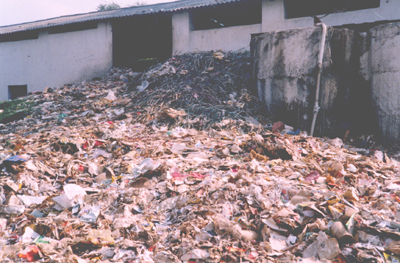| You are at Toxics Alert > News > Still miles to go in solid waste management | |||
 |
 |
||
|
Subscribe || Tell a Friend || Print View | ||
| Home | Editorial | Feature | Interview | News | Policy | Updates | Reports / International News | Partner | |||
|
Still miles to go in solid waste managementSource: The Hindu, Tamil Nadu, Date: , 2010Though the city generates over 3,500 tonnes of waste daily, so far a comprehensive solution for management of solid waste has eluded policy-makers.
 In the last decade industrialisation and economic development have led to an increase of 1,000 tonnes of garbage and further complicated waste management with newer components including e-waste adding to the bag of woes. The Chennai Corporation recently inaugurated an Integrated Solid Waste Management Facility at the Perungudi dump site. While it is a start, a lot more has to be done if the growth and expansion of the city have to be sustainable, say experts. A member of the expert monitoring committee, constituted by the Madras High Court to review the Perungudi dump yard, T. Swaminathan of Department of Chemical Engineering, IIT-Madras, says “Only a decentralised system of waste management that employs local level recycling strategies can significantly reduce the problem.” “As the metropolitan area increases, the problem is going to extend beyond the city. Areas such as Tambaram, Alandur and Ambattur are already facing serious waste management issues,” he adds. Mayor M. Subramanian says that in the long term, the solution offered would work. “The technology has been approved by various government agencies before we began work. We have got clearance for the process, which has been tailored to suit Indian conditions.” The company will commence operations in 18 months and make compost, refuse derived fuel pellets and eco bricks and in six months composting and making of bricks would be taken up. A similar proposal is in the pipeline for the Kodungaiyur dump yard. Biomining The Chennai Corporation also plans to rehabilitate the two landfill sites. A tender has been floated for biomining and the work is expected to begin in two months at Perungudi. An expert in solid waste composting, Sultan Ahmed Ismail says that during biomining care must be taken to see that no further leachate enters the water table. The company should also ensure that e-waste and bio-medical components from the mixed garbage are removed and sent for processing. He says sensitisation of residents would help in better waste processing. Kurian Joseph, Assistant Professor, Centre for Environmental Studies, Anna University, says “The average per capita generation of biodegradable varies from 230 to 430 grams per day and the total quantity of biodegradable waste from residential sources is about 2,200 tonnes per day. That is about 66 per cent of the total waste generated. Plastic and glass constitute only 1-2 per cent. If biodegradable waste is not taken to the dump site, recycling will become easier.” Presently segregation of recyclable waste is being carried out in around 25 wards of the 155 wards in the city and 100 more wards are to be included in two months. “The plastic bags supplied by the Corporation for segregation of garbage are very useful. The regularity of workers with tricycles has improved conditions in the recent months,” said Sonia Rajan, a resident of Tank Bund Road, Nungambakkam. However, in some wards where such segregation was launched has not taken off say members of the Chennai Corporation Red Flag Trade Union. “The tricycle that has been provided for segregation is being used for regular door-to-door collection. In some places there are not enough employees for collection of recyclable waste,” said a member. A senior official of the civic body says segregation among slum dwellers, red and green bins are being provided at a total cost of Rs. 32 lakh. However, many residents use the bins only to store water or groceries and not for the purpose that they are intended for. Sweeping of roads is another area that needs much improvement. Malaisamy, a resident of Kilpauk says, that some years ago, the mud used to be removed using brushes on a regular basis. But now only the main roads are being swept on a regular basis. After the rains it is even worse.” Though the Chennai Corporation says that in the past 4 years the operations of collection have been modernised with compactor trucks, mechanisation of garbage transfer stations, placement of imported garbage bins, GPS monitoring of compactor trips to ensure that no bins is left out in the rounds, door-to-door collection continues to suffer in some wards where residential associations depend on private individuals to collect garbage. Privatisation Similarly privatisation of solid waste management in four zones has only led to conservancy taking a backseat in these areas. Though it was the DMK which had introduced privatisation in the city with Onyx, it is the same party, which is now all set to remove Neel Metal Fanalca in a few months. “We have burnt our fingers with yet another private firm. But privatisation has also helped us improve our collection techniques and problems such as lorries spilling garbage on city roads are things of the past, with closed compactors,” said an official of the Corporation. Sivakumar, a resident of Thiruvanmiyur said that garbage clearance on interior roads were not proper. “Neel Metal Fanalca has not been able to clear garbage on a regular basis. Adding to this, rag pickers, dogs and cattle disturb the garbage and most of it is outside the bins,” he said. Privatisation of garbage clearance in many suburban areas too has not been successful. Many municipalities have privatised at least one-third of their wards as they lacked the required manpower. Ambattur municipality, which roped in the services of Neel Metal Fanalca, has levied fines on the company for poor waste disposal. |
•
Home •
FEATURE •
INTERVIEW •
NEWS •
POLICY •
UPDATES •
REPORTS / INTERNATIONAL NEWS •